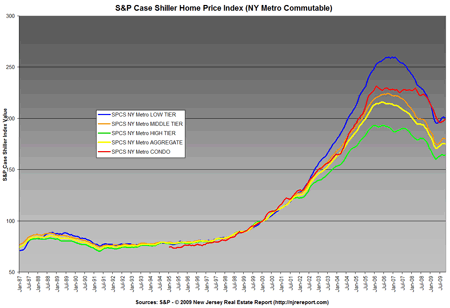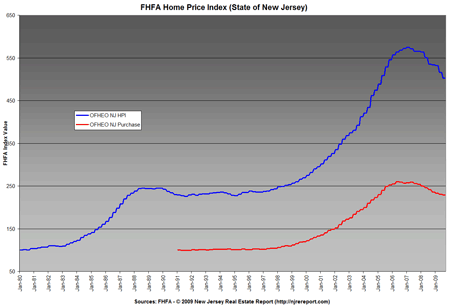From the New Jersey Association of Realtors: (This might just be the first time I’m citing the NJAR without insulting them).
Continuing Education for Real Estate Licensees Receives Final Legislative Approval (no link)
On January 7, 2010, the New Jersey Senate approved A-3099/S-2068, which provides for mandatory continuing education (CE) for real estate brokers, broker-salespersons and salespersons. The final passage of this bill in the Legislature represents two years of work by NJAR® and the NJAR® CE Task Force.
…
Governor Jon Corzine must sign A-3099/S-2068 before it can become law.
But much, much more importantly:
Legislation Permitting Rebates Approved by State Senate (no link)
At its January 7, 2010 meeting, the New Jersey Senate approved A-373, which permits rebates to be provided to consumers in real estate transactions. After several years of working with the sponsors of this bill, NJAR® secured amendments stating that only brokers can offer rebates to those purchasing property, rather than allowing all real estate licensees to offer rebates to buyers and sellers, as the original version of the bill would have allowed. In addition, the amendments provide greater consumer protections, including mandating that rebates can only be in the form of a credit or check and requiring that rebates be documented in a contract at the beginning of a brokerage relationship in a written or electronic form or in a buyer agency agreement.
Under current state law, New Jersey real estate licensees are not permitted to offer rebates. Before becoming law, this bill must be signed by Governor Jon Corzine.
For some more background on the latter change, from the Star Ledger (older piece):
Law under consideration would let brokers pay real estate clients
Soon your realtor could be paying you.
It’s illegal right now, but pending legislation would allow realtors and real estate brokers to pay home-buyers a portion of their commissions at the close of a deal.
New Jersey is one of 11 states that don’t allow the incentive, said Sen. Nicholas P. Scutari (D-Union), one of the bill’s sponsors. It would be up to the individual real estate agent to decide whether to pay the client.
“We’re trying to help the real estate market and to allow real estate agents and brokers to make deals happen,” Scutari said.
And on the first (fire away, this one really is meaningless. Damn, I insulted the NJAR. Guess I really can’t quote them without insult). From the Star Ledger:
N.J. Senate votes to require continuing education for real estate agents
“A major contributing factor to that (housing) crisis has been some bad advice home buyers received,” said Senate Majority Leader Steve Sweeney ( D-Gloucester), in a statement, adding that there is a need for real estate agents to become more knowledgeable.
The bill, S-2068, would demand that real estate agents complete an additional 16 hours of classes every two years — or face $200 in fines.


